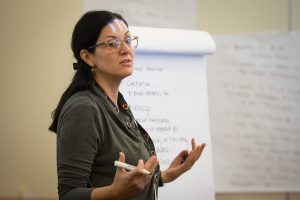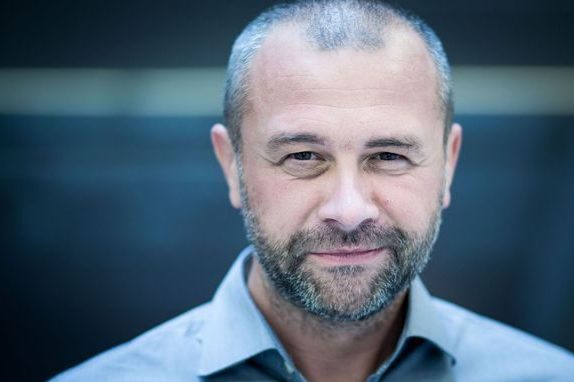
Interview: What does Notre Dame tell us about French philanthropy?
May 15, 2019
Special Focus: What new power means for fundraising
May 15, 2019Working to develop and support the next generation of civil society leaders across Central and Eastern Europe, Eduard Marček chair of the Slovak Fundraising Centre and EFA vice president talks to Fundraising Europe about the need to build non-profit leadership expertise and why it’s so important that charities don’t neglect their people.
[Fundraising Europe] Why is good leadership so important for fundraising?
[Eduard Marček] The work of the charity sector is about making the world a better place, bringing about social change and that’s no easy task. To be a changemaker, you need to know how to lead and unite others and most importantly how to lead yourself. A good leader will not only know how to achieve impact in line with the organisation’s mission, but consciously identify their own individual approach to leadership and how they can inspire and shape the organisation, community and profession they work within. At the same time they will be able to live according to their values and maintain balance in life.
From a fundraising capacity, a good leader is often the difference between an efficient organisation that articulates a strong case for support of its mission, attracting funds from a variety of channels, with one that struggles to break the vicious poverty cycle, sustain itself and meet beneficiary needs. Strong leadership will provide strategic direction, improve efficiency, reduce stress and provide a sense of unity, where everyone feels that they are on the same page, working to clear and consistent goals.
What does this mean for charities in Central and Eastern Europe?
Here, the fundraising profession is relatively young. There are many entry level fundraisers, but they often lack senior level or leadership experience, particularly when it comes to individual fundraising. Essentially, the first generation of civil society leaders after the fall of communism is gone from the sector, a new generation has taken over and we recognise the need to get this right. Good leadership can be transformational for those in managerial positions, their teams and the organisations and communities in which they operate.
While the CEE fundraising environment is different from many in Europe, we’re not alone. All across the continent, charities recognise the challenge in addressing this gap in leadership development. It can be difficult to attract experienced leaders to the sector and when it comes to developing existing staff, most training programmes are focused on managerial skills or fundraising as a discipline, rather than development of the individual and their progression.
What are the challenges in attracting strong leaders to the sector or developing talent within the fundraising profession?
Typically, people that work in the charitable sector are not primarily motivated by money, but by the cause and their own drive to make a positive impact on the world. And large salaries are not something that non-profits can typically offer. So, particularly when it comes to senior level roles, there is a question about how you can attract talent and sustain them in the organisation. We have to work that much harder to attract and retain people and we’re not always as good as that as we should be. There is a tendency for charities to be so focused on their core work that they can forget about their people, when they really need to be investing in them and recognising this as a priority.
How can charities address these challenges?
We really need to ensure we are genuinely valuing and investing in our people. Development is important, giving people the space and confidence to continue to grow and achieve with the organisation, rather than moving elsewhere. But we also have to ensure that – where possible – we offer those opportunities for transformation and self-development.
As is the case for any employer, it also means looking after our people in a broader sense. One of the biggest challenges we have these days is that people focus too much on their tasks and their busy job, the pace of life, forgetting that they need to take care of themselves if they are to achieve their best. While it’s important to focus on objectives, we cannot afford not to look after the people who are working so hard to deliver them.
In fact, we’ve just launched a survey to gain an even better understanding of people’s thoughts within the sector about leadership needs and we’re calling on leaders across the non-profit community in Europe to share their views.
What do you think makes a good leader?
There’s no definitive approach to good leadership. Ultimately, it is down to each individual and organisation to find their own path; one that will inspire and motivate others to achieve while working towards a collective goal. What is important is that there must be clarity over the values and aspirations for the organisation as a whole, and those must be brought into alignment. For me, I find that teamwork is critical; seeking to find that spark of interest that will make everybody feel that they understand the mission and values, and that they are part of the solution.
What is the Slovak Fundraising Centre doing to further develop leadership skills in the sector?

CEE Leaders of Tomorrow Programme
For the past four years, the Czech and Slovak Fundraising Centres have coordinated the Leaders of Tomorrow development programme each autumn. We draw together leadership experts from across the world (including Tony Myers and Kay Sprinkel Grace from Canada and the US) to join us for a 4-day in depth residential course and followed by a 12-month mentoring designed to help people identify and explore their own leadership potential. Currently the programme is focused on those working within CEE nations, but we see that there’s a need for this type of training all over Europe and we hope to extend it to other regions and nations in the future.
Working with the fundraising communities in our neighbouring countries to accelerate growth and learning, we run a one-day Slovak-Czech Fundraising Conference, which takes place on 17 May this week, and a 3-day annual CEE Fundraising Conference in October. This has grown from a very local event, into an international event with participants from 23 countries last year, and is now ranked by Donorbox as one of the top fundraising conferences globally. We’ll continue to build on these activities as we believe that collaboration is key. The more we can come together to share ideas and best practice, the faster the fundraising profession will grow and develop, funding civil society.
About Eduard Marček
Eduard has been working in the non-profit sector since 1997, and has been involved in many consulting, research and capacity building projects. As a fundraising consultant he worked with a number of non-governmental organisations, domestic and international, and conducted or contributed to various analytical studies and networking initiatives across Central and Eastern Europe. He is particularly interested in fundraising for difficult causes, major gift fundraising and legacies. Eduard is a co-founder and chair of the Slovak Fundraising Centre, head of individual fundraising for Transparency International Slovakia and currently serves as a Vice-President of the European Fundraising Association.




